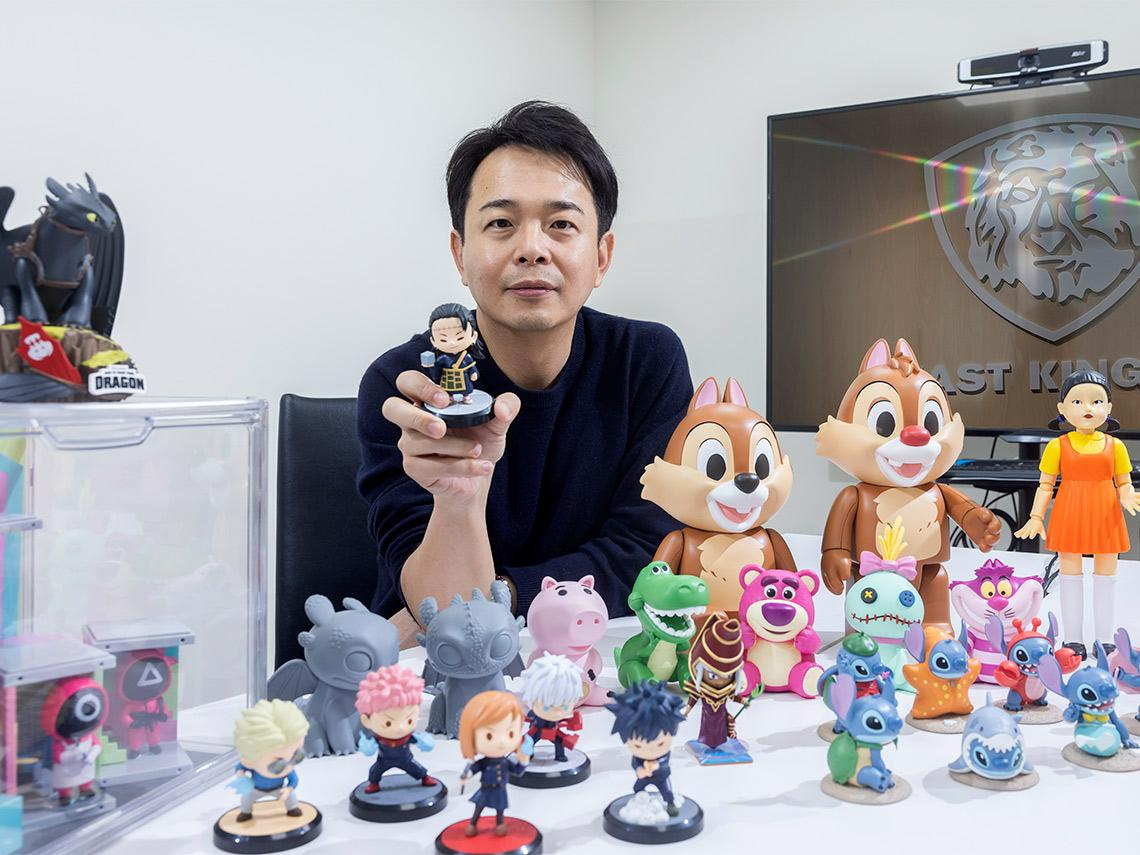
Written by | Tsai-Wei Hsu
Photos | Tung-Yue Wu
Issue | 1475
Date | 2025-03-26 09:34
Original URL
On retail shelves, you can spot figures from Squid Game, Jujutsu Kaisen, Toy Story, and more—what they all have in common is that they’re made by Beast Kingdom, Taiwan’s only OTC-listed collectible figure company.
Founded in 2010, Beast Kingdom is Taiwan’s sole figure and toy manufacturer to enter the capital market. In 2024, the company achieved a record revenue of NT$1.34 billion, with overseas sales surging 58% to NT$490 million. EPS also turned positive, climbing from around –3 in 2022 and 2023 to 0.97 in the first 11 months of last year.
This explosive overseas growth came from founder Allen Yang’s sharp market insight and bold investments.
“About 90% of our IPs are globally licensed, so the more we sell, the better,” Yang says. Developing a single product takes more than a year and costs millions, so increasing sales volume directly improves profitability.
In 2019, he shifted away from relying solely on e-commerce exports to individual customers and set up subsidiaries in the U.S., China, Thailand, and Malaysia—markets with stronger overseas sales—to distribute products directly through local channels.
Then COVID-19 hit, halting overseas operations. From 2020 to 2023, the company lost tens of millions annually. Yang admits he considered giving up on overseas subsidiaries but persevered thanks to stable domestic demand.

Going All In: Finding Opportunities Abroad
“If we survived the pandemic, there’s no reason to quit now!” Yang says. Determined to strengthen overseas business, he changed strategies and landed orders from Walmart, Sam’s Club, and Miniso.
Before the pandemic, Beast Kingdom had already been trying to enter Walmart, spending money on agents and matchmaking platforms but with little success.
In 2023, Yang returned to basics: trade shows. At Licensing Expo Las Vegas, Beast Kingdom showcased its flagship products, including a life-sized Iron Man. By chance, Walmart buyers visited the booth, leading to discussions and product testing. Over a year later, the first batch of Squid Game figures was shipped to more than 400 Walmart stores.
Following Walmart’s success, Yang’s team exhibited in Shanghai, securing deals with Sam’s Club and Miniso. These chains often place million-dollar orders, providing a huge revenue boost.
More IPs, More Opportunities
Yang explains that having a diverse IP lineup is crucial. U.S. retailers may favor trending Netflix series, while in China—where Netflix is banned—Disney classics sell better.
To meet varying demands, Beast Kingdom has aggressively expanded its IP portfolio, adding about nine new IPs annually. Last year, the company signed Squid Game and SAKAMOTO DAYS with Netflix, as well as Star Trek and Sesame Street for Western markets.
The 70/30 Rule
Not every IP succeeds. Yang recalls a game character figure that failed due to weak brand recognition. To manage risk, Beast Kingdom follows a “70/30 rule”: 70% of products come from evergreen IPs like Stitch and Iron Man, while 30% are new, high-potential IPs.
Stan Capital chairman Chan Ke-Chun notes that while global IPs bring ready-made fan bases, they also pose risks, as their popularity depends on the success of movies and anime—requiring sharp market foresight.
With a diversified IP strategy and major retail partners, Beast Kingdom’s global expansion is gaining momentum. Yang’s next plans include toy displays in convenience stores and collaborations with concert merchandise—continuing to push this “Beast” into new territories.